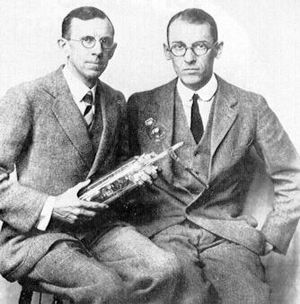Lester Germer facts for kids
Quick facts for kids
Lester Germer
|
|
|---|---|

Lester Germer (right) with Clinton Joseph Davisson (left) 1927
|
|
| Born | October 10, 1896 |
| Died | October 3, 1971 (aged 74) Shawangunk Ridge, New York, USA
|
| Nationality | American |
| Alma mater | Cornell University |
| Known for | Davisson-Germer experiment |
| Awards | Elliott Cresson Medal (1931) |
| Scientific career | |
| Fields | Physics |
| Doctoral advisor | Clinton Davisson |
Lester Halbert Germer (born October 10, 1896 – died October 3, 1971) was an American physicist. He is famous for his work with Clinton Davisson. Together, they showed that tiny particles, like electrons, can behave like waves. This idea is called wave-particle duality. Their discovery was a big step forward in science. It helped in the creation of important tools like the electron microscope. Their work also supported the ideas of another scientist, Louis de Broglie. Germer also studied how heat affects electrons and how metals wear down. He received the Elliott Cresson Medal in 1931 for his achievements.
Early Life and Science
Lester Germer was born in Chicago, Illinois. He later studied at Cornell University. During World War I, he served as a fighter pilot. After the war, he began working at Bell Labs in New Jersey. Bell Labs is a famous research center where many important scientific discoveries have been made.
The Davisson-Germer Experiment
One of Germer's most important contributions was the Davisson–Germer experiment. He worked on this with Clinton Davisson. In this experiment, they shot a beam of electrons at a nickel crystal. They found that the electrons bounced off the crystal in a pattern. This pattern was similar to how waves behave when they hit something.
This experiment proved a key idea in quantum mechanics. It showed that particles, which we usually think of as tiny bits of matter, can also act like waves. This is known as wave-particle duality. It means that things can have properties of both waves and particles. This discovery was very important for understanding the world at a very small scale. It also helped scientists develop new technologies, like the electron microscope.
A Passion for Rock Climbing
In 1945, when Lester Germer was 49 years old, he started a new hobby: rock climbing. He loved climbing and explored many places in the Northeast United States. His favorite climbing spot was the Shawangunk Ridge in New York.
Germer was known for being very friendly and helpful. People even called him "A one man climbing school." He was always happy to share his love for climbing with others. He had a perfect safety record in rock climbing for 26 years. He never had a serious fall while leading a climb.
In 1971, just a week before his 75th birthday, Lester Germer passed away. He had a heart attack while climbing a rock at the Shawangunk Ridge. He died doing something he loved.
See also
 In Spanish: Lester Germer para niños
In Spanish: Lester Germer para niños
 | Precious Adams |
 | Lauren Anderson |
 | Janet Collins |

